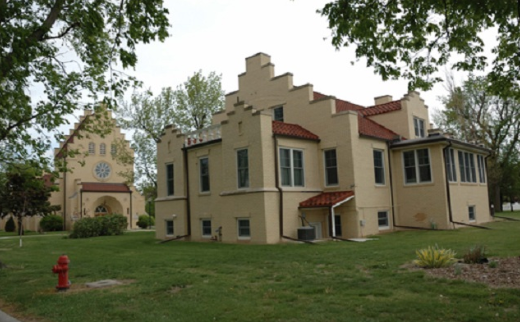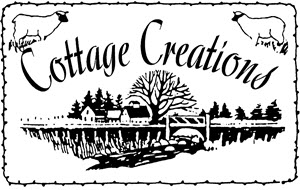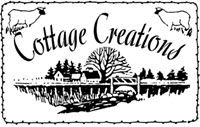In March 1950, when Arthur was eight years old, my parents plus five-year-old Ruth, traveled to Axtell, Nebraska. I remember it well, because they were gone over March 13th, my fourteenth birthday.
Mr. and Mrs. Fred Mattson, elderly friends of my folks, stayed with the rest of us kids while they were gone. Why did they go, a reader might ask? I’ll try to explain.
Arthur was born September 29th, 1941. After a few months, my parents knew, though their doctor hadn’t told them, that he was destined to have special needs. After a number of appointments, he was diagnosed as being “a Mongoloid,” and my parents were advised to “put him away.” They didn’t.
Three and a half years later (January 12, 1945), Ruth arrived. My mother had her hands full – an infant plus a child who had little language and needed far more care than most toddlers. We older siblings were in school and of little help.
My father’s bricklaying profession caused him to work away from home during the week, sought out institutions in Wisconsin that could provide a solution. He was dismayed viewing the warehousing conditions when he visited the state institutions – Northern Colony in Chippewa Falls or Southern Colony in Eagle Grove. He visited St. Coletta’s in Jefferson, but neither of my Lutheran parents could relegate Arthur’s care to a Catholic institution.
 Through relatives in Nebraska my parents learned about Bethphage Mission, an institution run by the Swedish Lutheran church. Lutheran Deaconesses, trained in Omaha, staffed Bethphage. Years before, when my mother was in high school and their family lived in Omaha, her father, my Grandpa Olander, had been the chaplain at the Deaconess’ home.
Through relatives in Nebraska my parents learned about Bethphage Mission, an institution run by the Swedish Lutheran church. Lutheran Deaconesses, trained in Omaha, staffed Bethphage. Years before, when my mother was in high school and their family lived in Omaha, her father, my Grandpa Olander, had been the chaplain at the Deaconess’ home.
Mom and Dad made an application for Arthur, and were put on a waiting list. Nearly a year later they received a letter stating there was an opening.
I think all of us kids felt like we were saying goodbye forever to Arthur. Axtell was nine hundred — yes, nine hundred miles from Ogema, Wisconsin. Mom’s sisters both lived in Nebraska – Esther in Omaha and Anna in Wahoo, but Axtell was in Western Nebraska, not far from Colorado.
When my parents and Ruth returned home, reality struck. The little kid who’d been part of our lives was gone. We tried hard to believe he was in a better place. No longer would he climb up and unlatch the hook high up on the screen door and “escape,” run next door to the elementary school to find one of us kids. He probably wanted to attend school himself. Not able to determine how to safely cross the road, he’d simply dash across the street to Peterson’s, where ice cream and candy were sold, or to Helmer Dahl’s station, a half block west, where soda pop sold for a nickel. Dahl’s station served cars and trucks traveling busy Highway 13.
All of this happened to my mother, who could hardly leave home to chase after him with Ruth toddling around the house. But once he was gone, she simply couldn’t come to grips with her loss. Beside herself, all day, every day, she nearly suffered a nervous breakdown.
Dad realized what he had to do. In May, without telling Mom, he made a return eighteen-hundred-mile round trip in our ’39 Buick to bring Arthur home. Dr. Christianson, the administrator at Bethphage informed Dad Arthur could be gone for thirty days – otherwise his spot at Home Bethel would be opened to someone on the waiting list.
Of course, we were thrilled to see him. Mom was ecstatic.
And Arthur? Almost immediately upon his return, Mom observed some positive differences in her eight-year-old son. Whereas she’d always fed him, he made attempts to feed himself. He tried to dress or undress himself without assistance. Slowly she came to terms… he needed to return to Nebraska and be in the care of those who could better teach him the skills he needed to become more independent.
In 1950 Dad was already working in Iowa, building St. Peter’s Catholic Church in New Haven. To return Arthur, Carl (19), John (16) and I (14) drove to Nebraska. We stayed overnight in Wahoo with Aunt Anna and planned to stay in the motel in Axtell one night before returning. Both my brothers were on Dad’s crew so they were in a rush to return to Iowa, and I suppose I was to hang out with them until the weekend when they traveled three hundred miles north to Ogema.
When we got to Bethphage Arthur was welcomed back with open arms. Home Bethel was a lovely two-story Spanish Mission yellow brick building. Children and young adults occupied the first floor, while upstairs housed the ladies. (The ladies would probably be classified as mildly retarded and most of them worked during the day in the vegetable gardens, cleaning, feeding those who needed assistance, etc.)
Because Artie, as he was known, was an adorable little Down syndrome kid, he received motherly attention from many, staff and guests (clients) alike.
Bethphage itself was a beautifully landscaped campus comprised of four or five residences for the two hundred guests, two more for staff, a beautiful chapel, all in Spanish Mission-style architecture.
So, my brothers and I had to say goodbye to Arthur again. I froze. I did not want to leave. I don’t remember how I approached Sister Julianne Holt, the head deaconess, but I did. I asked if I could stay to work for the summer. My age was a big factor I suppose, but she finally agreed. My job would be housekeeping in the deaconess’s home and I’d receive twenty-five dollars a month.
I called home and my mother must have said yes (I don’t take “no’s” easily). I think my brothers felt the same about leaving Arthur and were happy I wanted to stay. We said goodbye.
I suppose I had a week’s worth of clothes in my suitcase. The boys must have given me a few dollars for toothpaste and such at the general store in Axtell, a mile away.
Some memories from that summer…
Each deaconess was a graduate of the Deaconess Institute in Omaha. Their starched white uniforms, white stockings and shoes, the stiff nursing cap – set them apart from anyone else. The only piece of jewelry each wore was a heavy gold cross on a long chain.
Each worked in four residences – Home Bethel, (the children’s home), Home Emmaus (men), Home Tabor (women) and Home Bethesda (where the most physically and mentally challenged guests resided).
So, I suppose I shouldn’t have been surprised when these dedicated women returned to Home Serepta for meals. Their behavior changed as they chatted rather formally among themselves. I don’t remember any one-to-one conversation with any of them. The summer help was just that – the summer help.
My very plain single room on the second floor of Home Serepta, the deaconess’ residence, looked out over the campus. The deaconess’ rooms were on the second floor, while the summer help shared the third-floor quarters. (I have no idea why I was placed on the second floor.) The first night, suddenly homesick, I thought I heard a resident crying in the distance. Later I learned the haunting sound was the call of a mourning dove. We didn’t have mourning doves in Wisconsin.
The Axtell High School band came to the Mission every Wednesday and entertained from the gazebo. Arthur loved to mimic the conductor’s movements.
As summer help, we were required to attend Bible study on Tuesday evenings. We met in the very formal living room, the living room I dusted several times each week. There were times I’m sure I nodded off.
I worked in the kitchen, carried dishes back and forth to the dining room where each sister had her own place at the long table. After each meal I washed dishes. We served breakfast cereal in china serving bowls, a far cry from the open boxes of Wheaties, Cheerios and Rice Krispies on our kitchen table back home.
I was assigned a silver napkin ring for the duration. Once every week I polished everyone’s ring, and then properly folded a fresh linen napkin into each. I learned to use a “silent butler,” or “crumber,” a silver-handled brush and tray (think dustpan) to clear the linen tablecloth of debris.
The other summer workers were either high school or college-age. Slowly I got to know them. Several afternoons we sunbathed, Nebraska style. We couldn’t lay blankets on the campus (the indecency of a bathing suit on hallowed grounds) so we walked at least a mile to spread a towel on the wooden irrigation ditch bridge.
I spent a part of my afternoon free time with Arthur. He always seemed happy. Though he liked to see me, he was happy with others. I wrote home often, assuring Mom of his good care.
At the end of the summer, I asked Sister Julianne if I could return the following year and she said yes. I returned to Ogema by taking a bus from Axtell to Omaha where I stayed with Aunt Esther and Uncle Frank. They helped me board the train for Minneapolis. I stayed with my older sister Miriam two or three days and we did some shopping for school clothes with “all my money.”
From Minneapolis, I took the Greyhound, changed busses at Abbotsford in order to travel north forty miles to Ogema.
The following June, after my freshman year at Westboro High, our family moved to Iowa. Dad was about to begin building Our Saviour’s Lutheran in Osage.
The first Sunday evening after we arrived, my brother Carl dragged me to Luther League at T.P. Solem’s house, the parsonage. That was the first time I laid eyes on Paul! His sister Audrey had insisted he attend the meeting with her, but all I knew, as I sat on the davenport, that there was a really cute guy sitting in the rocking chair, looking quite bored. On our (Carl’s and mine) walk home, Paul and Audrey stopped their car and we were all introduced. Later that week, Audrey convinced Paul to call me for a date. We went to the drive-in movie at Mason City. I liked him and we promised to exchange letters during the summer.
The following week my brother John drove Mom, Ruth and me to Axtell. John, seventeen, told me he worried whether or not he had the skills to drive through Omaha. I think he did just fine.
Arriving at Bethphage, Mom could see the positive changes in Arthur. Still, she had a terrible time saying goodbye to him. That sadness never changed over the annual visits. (Arthur lived in Nebraska until he was forty when he moved to Opportunity Village in Clear Lake.)
I had a wonderful summer – the pay was the same – twenty-five dollars a month.
I worked at Home Tabor, in the kitchen. The hired “core crew” was augmented with guest workers. We began early in the morning, had afternoons free, and returned for evening meals. The gardens were in full production, so we were busy preparing produce and canning for the winter.
I witnessed my first grand mal seizure at Home Tabor. No one panicked, but rather helped the person get through the ordeal safely. Afterwards the patient was helped to go “home” so they could rest.
I roomed on the third floor with the rest of the summer gals. One weekend when I was free (once monthly) I went home with Ardis Soneson. Her family farmed and that particular weekend they were harvesting wheat. I got to tag along to the field, as Ardis worked on the crew. She had two brothers who were lots of fun…it was so hot; I must have drunk a gallon of lemonade out there.
Another weekend I went home with Ruth Ann Lindholm. Her dad was a minister, so we went to church and generally behaved. I remember the visit being very nice.
I had a date or two with Jim Lingwall from Axtell. Jim’s dad, Pastor Lingwall, was the chaplain at the Mission. I liked Jim better than he liked me; I think. When dating we had to sign out of Home Serepta and then sign back in before 10:00 pm. Any violations might result in losing your employment. Sister Julianne was always there to monitor our behavior upon return.
At the far end of the third floor, we could step out the window to the flat rooftop over the sun porch below. One very hot night (no air conditioning anywhere) we decided to sleep on the roof. The next day I was full of red speckles all over my body. After a few hours they disappeared.
(I had the occasion to sleep on a rooftop a few years later – the same thing happened.)
I had three letters from Paul while I was there. I reciprocated properly by sending him three too.)
At the end of the second summer, I returned home again by riding the Greyhound to Omaha, spending a day with Aunt Esther, boarding another bus to Des Moines, and transferring to a northbound bus that stopped in Mason City. I was very nervous about beginning my sophomore year at Osage High School and I was hopeful I’d see or hear from Paul Anderson again.



